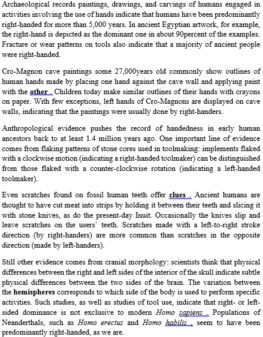Read the following passage and mark the letter A, B, C or D to indicate the correct answer to each of the questions from 43 to 50.
A survey is a study, generally in the form of an interview or a questionnaire, which provides
information concerning how people think and act. In the United States, the best-known surveys are the Gallup poll and the Harris poll. As anyone who watches the news during presidential campaigns knows, these polls have become an important part of political life in the United States.
North Americans are familiar with the many “person on the street” interviews on local television
news shows. While such interviews can be highly entertaining, they are not necessarily an accurate indication of public opinion. First, they reflect the opinions of only those people who appear at a certain location. Thus, such samples can be biased in favor of commuters, middle-class shoppers, or factory workers, depending on which area the new people select. Second, television interviews tend to attract outgoing people who are willing to appear on the air, while they frighten away others who may feel intimidated by a camera. A survey must be based on a precise, representative sampling if it is to genuinely reflect a broad range of the population.
In preparing to conduct a survey, sociologists must exercise great care in the wording of questions. An effective survey question must be simple and clear enough for people to understand it. It must also be specific enough so that there are no problems in interpreting the results. Even questions that are less structured must be carefully phrased in order to elicit the type of information desired. Surveys can be indispensable sources of information, but only if the sampling is done properly and the questions are worded accurately.
There are two main forms of surveys: the interview and the questionnaire. Each of these forms of survey research has its advantages. An interviewer can obtain a high response rate because people find it more difficult to turn down a personal request for an interview than to throw away a written questionnaire. In addition, an interviewer can go beyond written questions and probe for a subject’s underlying feelings and reasons. However, questionnaires have the advantage of being cheaper and more consistent.
Question 44: According to the passage, one advantage of live interviews over questionnaires is that live interviews ______.
A. minimize the influence of the researcher
B. are easier to interpret
C. costless
D. can produce more information













Đáp án D
Dịch nghĩa. Theo bài đọc, một lợi ích của việc phỏng vấn trực tiếp bằng mẫu hỏi đó là phỏng vấn trực tiếp _____.
A. hạn chế tối đa ảnh hưởng của người nghiên cứu
B. dễ hiểu hơn
C. không tốn kém
D. có thế đưa ra nhiều thông tin hơn
Giải thích: Thông tin nằm ở “In addition, an interviewer can go beyond written questions and probe for a subject’s underlying feelings and reasons”